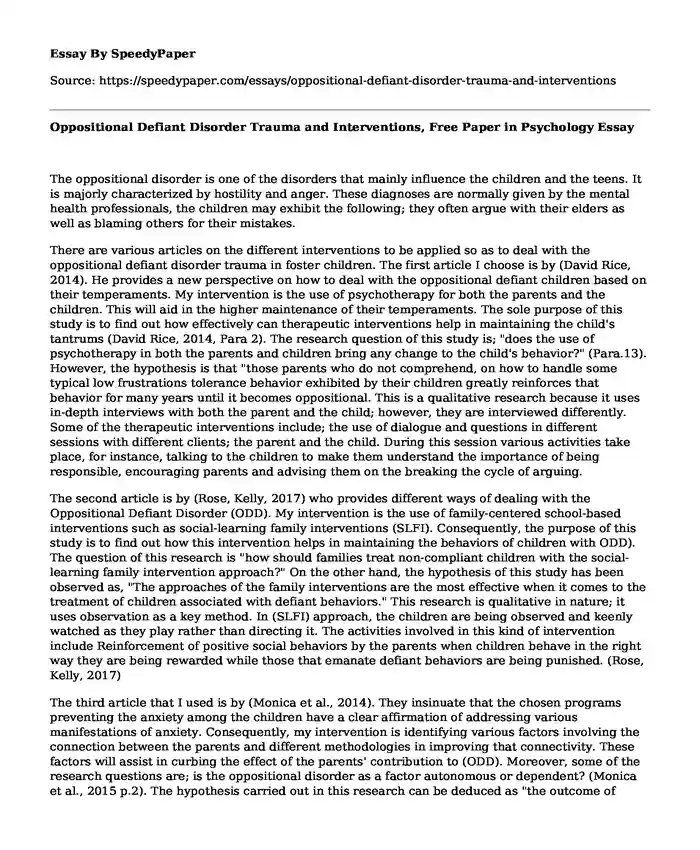
| Type of paper: | Research paper |
| Categories: | Psychological disorder |
| Pages: | 3 |
| Wordcount: | 718 words |
The oppositional disorder is one of the disorders that mainly influence the children and the teens. It is majorly characterized by hostility and anger. These diagnoses are normally given by the mental health professionals, the children may exhibit the following; they often argue with their elders as well as blaming others for their mistakes.
There are various articles on the different interventions to be applied so as to deal with the oppositional defiant disorder trauma in foster children. The first article I choose is by (David Rice, 2014). He provides a new perspective on how to deal with the oppositional defiant children based on their temperaments. My intervention is the use of psychotherapy for both the parents and the children. This will aid in the higher maintenance of their temperaments. The sole purpose of this study is to find out how effectively can therapeutic interventions help in maintaining the child's tantrums (David Rice, 2014, Para 2). The research question of this study is; "does the use of psychotherapy in both the parents and children bring any change to the child's behavior?" (Para.13). However, the hypothesis is that "those parents who do not comprehend, on how to handle some typical low frustrations tolerance behavior exhibited by their children greatly reinforces that behavior for many years until it becomes oppositional. This is a qualitative research because it uses in-depth interviews with both the parent and the child; however, they are interviewed differently. Some of the therapeutic interventions include; the use of dialogue and questions in different sessions with different clients; the parent and the child. During this session various activities take place, for instance, talking to the children to make them understand the importance of being responsible, encouraging parents and advising them on the breaking the cycle of arguing.
The second article is by (Rose, Kelly, 2017) who provides different ways of dealing with the Oppositional Defiant Disorder (ODD). My intervention is the use of family-centered school-based interventions such as social-learning family interventions (SLFI). Consequently, the purpose of this study is to find out how this intervention helps in maintaining the behaviors of children with ODD). The question of this research is "how should families treat non-compliant children with the social-learning family intervention approach?" On the other hand, the hypothesis of this study has been observed as, "The approaches of the family interventions are the most effective when it comes to the treatment of children associated with defiant behaviors." This research is qualitative in nature; it uses observation as a key method. In (SLFI) approach, the children are being observed and keenly watched as they play rather than directing it. The activities involved in this kind of intervention include Reinforcement of positive social behaviors by the parents when children behave in the right way they are being rewarded while those that emanate defiant behaviors are being punished. (Rose, Kelly, 2017)
The third article that I used is by (Monica et al., 2014). They insinuate that the chosen programs preventing the anxiety among the children have a clear affirmation of addressing various manifestations of anxiety. Consequently, my intervention is identifying various factors involving the connection between the parents and different methodologies in improving that connectivity. These factors will assist in curbing the effect of the parents' contribution to (ODD). Moreover, some of the research questions are; is the oppositional disorder as a factor autonomous or dependent? (Monica et al., 2015 p.2). The hypothesis carried out in this research can be deduced as "the outcome of rising up the recruitment plan so as to increase the thorough engagement of the parent". Moreover, the research study is quantitative in nature, in that, there is the use of quantitative analysis of the information and sampling is used as one of the data collection methods. Those with ages below 5years and above 17 years were eliminated, as well as the duplicate persons. 4380 SNAP were available which is equivalent to 70% most of them being parents and the remaining being teachers. (p. 2).
Reference
Ross, Kelly, (2017), "School Based Interventions for School-Aged Children with Oppositional Defiant Disorder: A Systematic Review" 788.
Monica Cavanagh1, Declan Quinn1, Don Duncan2, Tom Graham1, and Lloyd Balbuena, (2014). Oppositional Defiant Disorder Is Better Conceptualized as a Disorder of Emotional Regulation: Journal of Attention Disorder p. 1-9
David Rice, (2014), Psychotherapy for Oppositional-Defiant Kids with Low Frustration Tolerance and How to Help Their Parents, Too
Cite this page
Oppositional Defiant Disorder Trauma and Interventions, Free Paper in Psychology. (2022, Apr 15). Retrieved from https://speedypaper.net/essays/oppositional-defiant-disorder-trauma-and-interventions
Request Removal
If you are the original author of this essay and no longer wish to have it published on the SpeedyPaper website, please click below to request its removal:
- Psychology Essay Sample - To Love Others, Love Yourself
- Mind Change - Book Review Essay Example
- Free Paper Sample: Financial History of Biogen Inc. Between 2013 and 2017
- Example of Compare and Contrast Essay on Chinese and American Cultures
- Free Essay: Ethical and Moral Practices of Doing Business in Sub-Saharan Africa
- Race and Stereotypes as a Subject for Art - Free Essay Example
- Essay Sample on Organic Solidarity and Gesellschaft Social Structure
Popular categories




